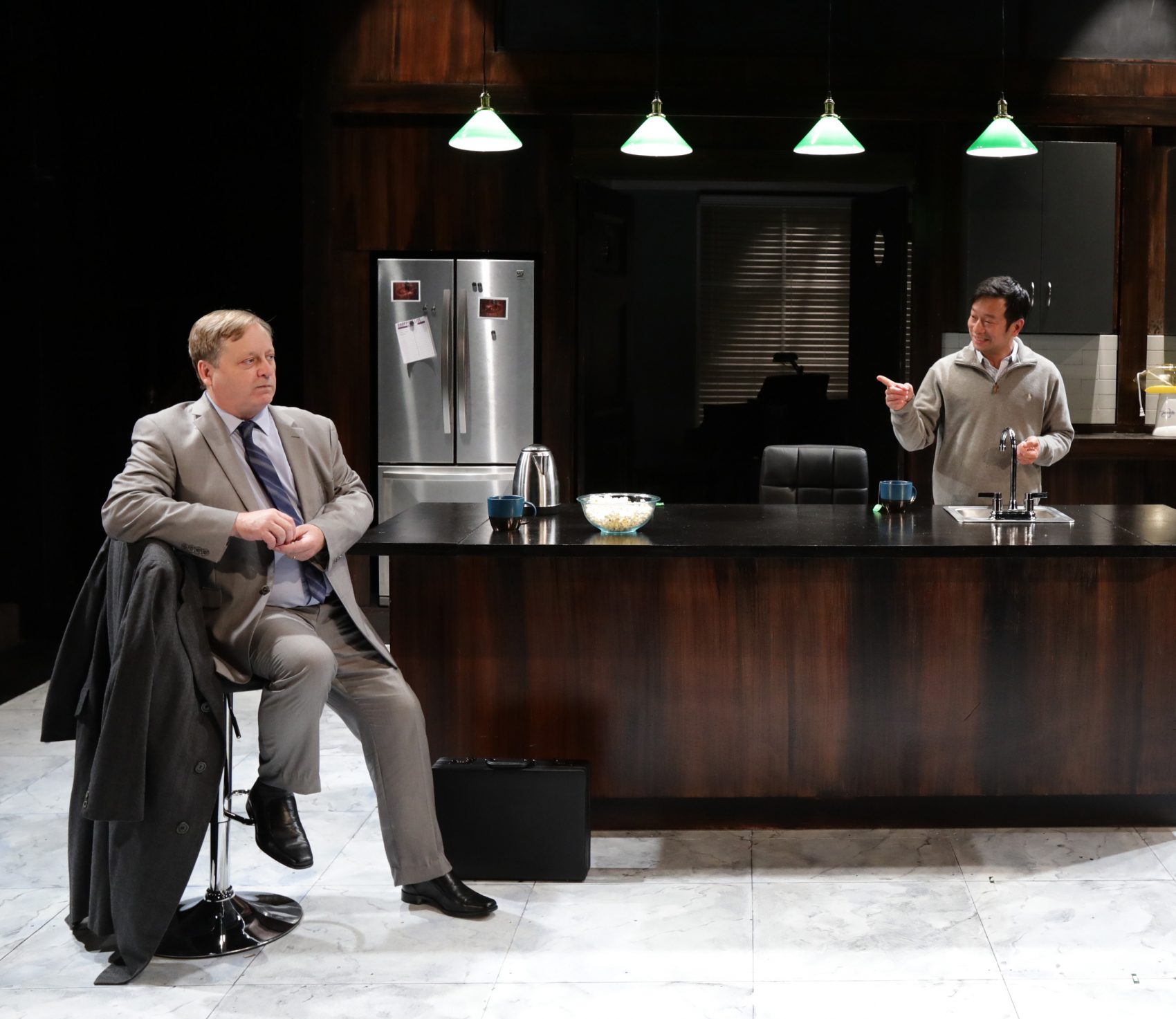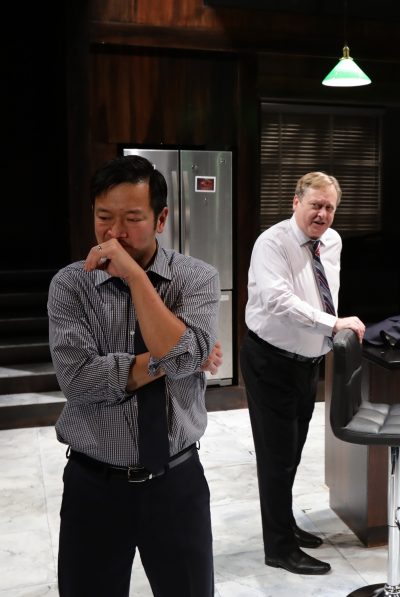Advertisement
'Warrior Class' At The Lyric Stage Company — The Politics Of Selling Your Soul

Playwright Kenneth Lin has written for Netflix’s dark political potboiler “House of Cards,” so you come to the Lyric Stage Company’s production of his play “Warrior Class” with the expectation that you’re in for some hard-edged stuff. That expectation is met, but the cast of this taut, intimate three-hander — Michael Tow, Steven Barkhimer and Jessica Webb, under the direction of Dawn M. Simmons — underlines those hard, sharp edges with a soft lining of humanity.
Barkhimer plays Nathan Berkshire, a Republican political operative who’s handling hot new rising star Julius Lee (Tow), a freshly minted member of the New York State Assembly and possible Senate material. Berkshire is the sort of political animal who dwells in noirish old movies — slightly rumpled, well-worn, gifted at gab and glad-handing, and yet utterly clear-eyed and ruthlessly, diabolically sharp.

Berkshire tries to convince Lee’s college girlfriend, Holly (Webb), to sign off on “certification papers,” essentially documents attesting to the ordinary, non-controversial nature of her previous relationship with Lee and, not incidentally, his purportedly sterling character.
The problem is, Holly is unwilling to sign off. Two decades earlier, her relationship with Tow ended in a way that left her scarred and traumatized. The situation is not impossible; Holly is willing to play along, but she has an asking price. Julius, already navigating a career that puts him in the pockets of more established figures in power, isn’t willing to pay that price. It’s up to Berkshire to broker a deal everyone can live with.
“Warrior Class” is about moneyed interests, backroom deals, and the art of figuring out how much of your soul to auction off for the sake of career ambition, but it’s not about identity politics. An early scene addresses the political question of Julius being the son of Chinese immigrants, with Berkshire concerned that voters, seeing Julius’ face, will think not about his faith or his military service, but about the South Korean man behind the Virginia Tech mass shooting. When Julius responds unhappily that this is “lowest common denominator thinking,” the brutally pragmatic Berkshire fires back with, “I like math I can do in my head.”
Point made, the play largely steps away from racial issues. What’s really in question here is how much character counts in life and in public service, and whether a person’s character, once tarnished, can be restored. Do the actions of a heartsick young man speak to the core capabilities of the man he’s become 20 years later?
With a few quick alterations the space transforms to Julius’ Manhattan apartment, a space that’s equally neat and impersonal. The double doors swing open to reveal a glimpse of a low-lit room containing a baby grand piano — visual shorthand for ability and accomplishment. The surprise is that when we hear it played, skillfully and with heart, it’s Berkshire at the keyboard, in a moment that clarifies the complexities and contradictions of his character like nowhere else. All three characters have moments of blunt manipulation and raw regret, and a scene between Holly and Julius erupts with palpable rage and fear, but it’s Berkshire who anchors the play, fluently referencing “The Iliad” and “The Art of War,” coaxing and coddling when he needs to and spelling out grim realities in unvarnished terms when kindness won’t do the job.
One might quibble about the play’s early preponderance of political jargon, as Julius and Berkshire discuss, in some depth, alliances and committee memberships. If nothing else, the exchange sells us on Berkshire’s expertise and Julius’ commitment, at least in theory, to good government, but it goes on too long. One might also quarrel with the ending, which straddles the line between being dramatically earned and barrel-bottom gratuitous.
But there’s no getting around the pure potency that’s been packed into this hour and a half excursion behind the scenes and into the real machinery of power. Adding to the impact is Elizabeth Cahill’s sound design, with a score that varies from synthy noir to dirty but silken jazz. Also effective is Daniel H. Jentzen’s lighting design, which helps orchestrate the play’s intricate interplay of moods.
“Warrior Class” continues through Nov. 13 at the Lyric Stage Company of Boston.
